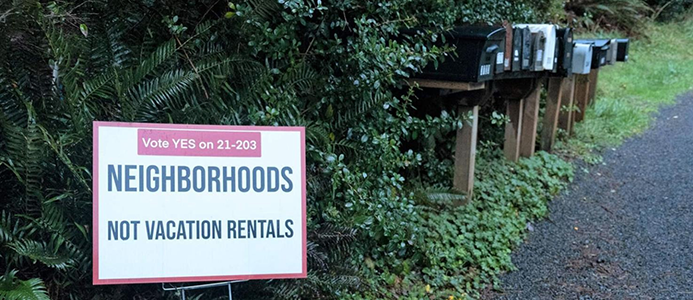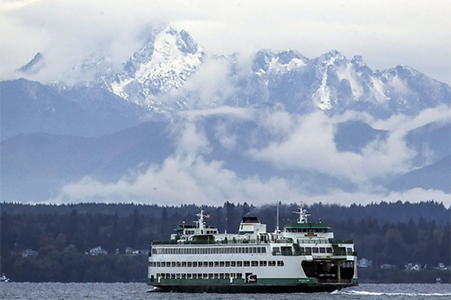Vacation rentals reducing availability of housing for local workers
||| FROM THE BULLETIN ||| Reprint at request of Orcasonian reader
DEPOE BAY — Postcards with big promises began showing up in mailboxes in Oregon coastal communities in 2019:
“Rent your home short term, use it when you want to, guaranteed $5,000 more monthly income than you’re earning with your current property management firm,” recalled Monica Kirk, a retiree.
Kirk’s neighborhood began to transform almost immediately.
Internet-based service firms such as Airbnb, Vacasa and VRBO had been bumping up against short-term rental caps in nearby towns. So they began aggressively soliciting property owners in quieter, unincorporated seaside neighborhoods like Kirk’s, where there were fewer restrictions on rentals. Over the next year, according to a public records request Kirk filed, the number of licensed short-term rentals in unincorporated neighborhoods in Lincoln County grew from 385 to 601.
“During most of the year, not just the season, there were more renters than there were full-time residents,” Kirk said.
The new visitors were careless with trash, which drew pests. They drove too fast on lightly maintained roads. They crowded the rentals with more people than were intended for aging, often unpermitted septic systems. Worst of all, taking all those homes out of the potential long-term rental stock made it that much more challenging for working people to afford homes in the county, a tourist community on the central Oregon Coast. The area, like all popular vacation destinations, needs affordable housing for the seasonal housekeepers, retail clerks and restaurant workers who keep it humming.
Kirk and her neighbors began gathering signatures for a ballot initiative that, over the next five years, will do away entirely with short-term rentals in unincorporated communities in the county. Its successful passage in November was one of the few bans to be approved in a wave of efforts aimed at addressing the effects of short-term rentals on affordable housing in the tourism communities of the West.
Even before the pandemic, the destination towns of the West had a shortage of affordable housing. Limited supply, the remote nature of some of the communities, zoning restrictions and even short construction seasons all contributed. But the COVID-19 pandemic accelerated everything, including the rise of so-called Zoom towns. Freed from physical offices, suddenly people could live, work and recreate in the vacation communities of the West, with few needs beyond a high-speed internet connection to do jobs that formerly required their presence in major cities.
It also in recent years became much easier for owners of second homes to list vacancies with internet-based property firms that promise a steady cash flow in places with seasonal, tourism-based economies. When those homes enter the short-term vacation rental pool, they’re no longer available to the local workforce.
Brian Chesky, Airbnb’s CEO, said recently that about one-fifth of the company’s business by room nights is now stays of 30 days or more. People are booking longer stays that combine work and leisure, an area the company sees as full of potential growth. Vacasa, which is based in Portland, went public in early December on the promise of its technology to manage properties, and the understanding that vacation rentals for large groups or families are an untapped market. Jamie Cohen, Vacasa’s chief financial officer, told Oregon Public Broadcasting that at least a fifth of people staying in vacation rentals did so for the first time during the pandemic.
There are few statewide efforts to address the effects of short-term rentals; some states, such as Idaho, outright prohibit local governments from enacting bans. Individual Idaho resort communities can and do enact health and safety regulations for short-term rentals, as well as collect sales and lodging taxes. And voters in eight separate Colorado mountain towns recently passed various local option sales taxes and lodging taxes on short-term rentals, the proceeds of which are aimed at addressing housing shortages.
Voters in Vail, for example, approved a half-penny sales tax increase to help pay for housing initiatives. Several communities expanded their borrowing capacity to pay for measures that help address labor shortages, driven in part by a lack of affordable housing because so much has been converted to short-term rentals.
Colorado state Sen. Chris Hansen, a Democrat, has proposed legislation that would tax many short-term rentals at the lodging property rate, which hotels pay, for each day the property is rented more than 30 days a year.
His bill emerged in response to developers who began converting ski-town hotels into short-term condominium rentals with individual owners. That meant the new rentals qualified for lower residential property tax rates, instead of the lodging rate. In the ski town of Steamboat Springs, for example, the situation crushed the tax base by wiping $1.5 million out of the local school budget, Hansen said.
“If we don’t have a stable property tax base, we then start to create a huge, additional burden on the state budget,” Hansen said. “And we have a lot of constraints on our state budget. I think the main focus here is really making sure that we’ve got adequate revenue for schools, for fire districts, for police force, etc., public safety, that are dependent on property taxes.”
Real estate agents, property management companies and many individual property owners oppose the legislation. They would rather see other options used, including restricting short-term rentals to certain zones of communities, said Julia Koster, executive director of the Summit Alliance of Vacation Rental Managers, which represents the owners and managers of about 7,000 short-term rental units in and around ski towns including Breckenridge.
**If you are reading theOrcasonian for free, thank your fellow islanders. If you would like to support theOrcasonian CLICK HERE to set your modestly-priced, voluntary subscription. Otherwise, no worries; we’re happy to share with you.**








Like San Juan County, Depoe Bay and most of the Oregon coast have only two cash crops; retirees and visitors. There is some modest overlap, but for the most part the needs and desires of retired residents are in conflict with the needs and desires of visitors. This is a problem as old as Pompeii. If you took all the primary, secondary, and tertiary income from vacation rentals away from the island, there would only be construction and tending wealthy retirees as a source of jobs and income. Most of the stores and restaurants in town would not survive without plentiful visitors. I suggest that before you decide to strangle the goose that lays the golden eggs, you might want to realistically consider what you are planning to replace it with. No community can survive without regular infusions of outside cash. Some places have natural resources to exploit, which works until the resource runs out (timber in Forks, WA for example). Some places have industry of some sort that produces goods to be sold elsewhere (mill towns in New England for example). What does Orcas island have? A beautiful environment that people want to enjoy. So how do we maintain the necessary cash flow to sustain a population with beauty? And without ruining it at the same time?
It’s always reassuring to know that only vacation renters ever break the law, speed, litter, make noise or show any type of disrespect. Clearly, with this logic, if no one ever strayed from their own permanent resident community there would be no crime or unhappiness on our planet. Orcas has a multitude of ways to limit outsiders, so if that’s what the community wants, bar the doors. Make it as hard to get top Orcas as it is to get to Waldron and you will never have to deal with outsiders again. Just saying…
Glad to see we’re back to bashing outsiders and “others.” That always gets a lot of posts…
The link to the Bend Bulletin does not work, at least for me.
The link has been fixed.